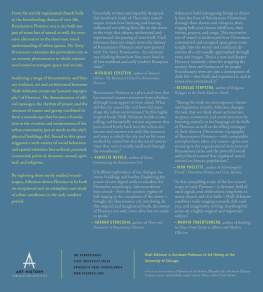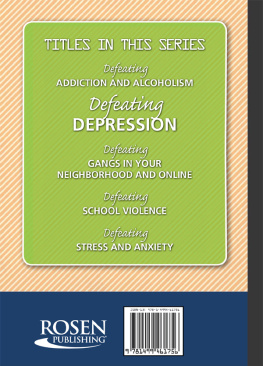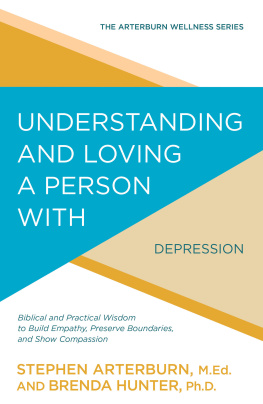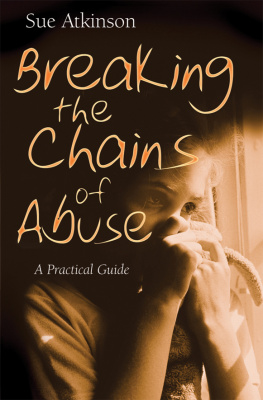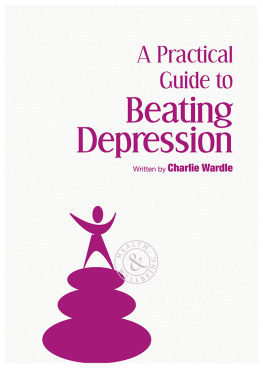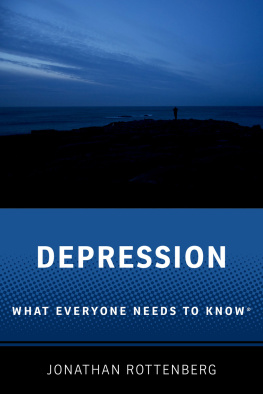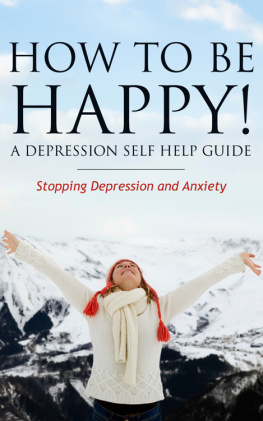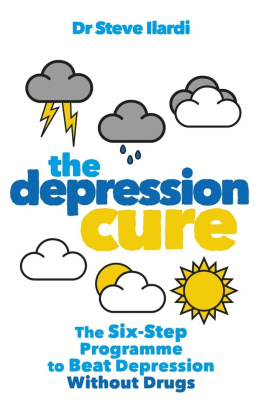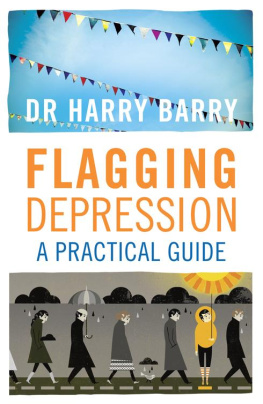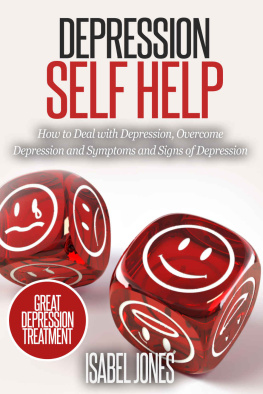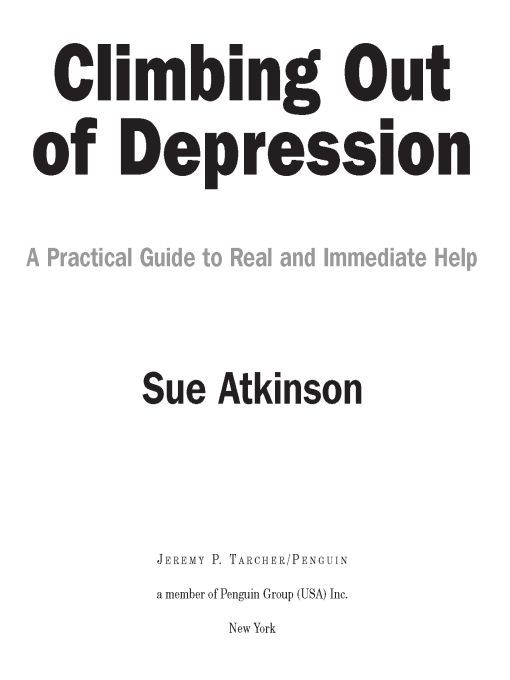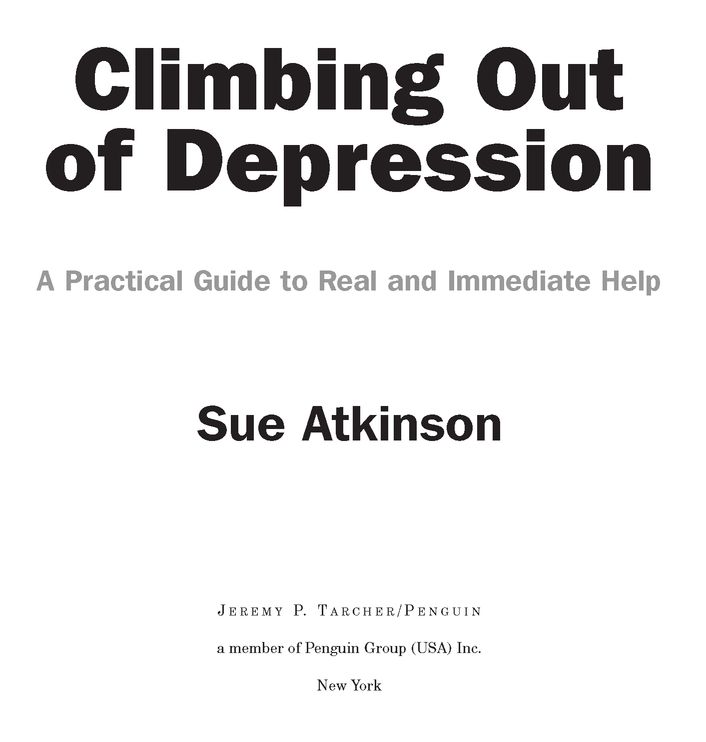Table of Contents
For those who held on to the lifeline
when the going was tough,
for those who sat with me at the bottom of the cliff
and held my hand,
and for those who showed me,
by their love,
that the climb was worthwhile
Preface to the new edition
It has been so thrilling to meet and talk to depressed people and their caregivers since Climbing Out of Depression was first published twelve years ago. People from all over the world have written to me, and Ive made some good friends through those letters. I have asked some of these people to make suggestions as to how the book could be improved.
Ive tried to incorporate a number of those suggestions into this new edition, but some information is better found elsewhere. For example, I didnt think I should focus on medication. Such information gets out of date, and it is best to talk to a doctor or look at the Depression Alliance website.
What has changed?
I have seen such dramatic change in some depressed people (including myself), and that is something for all of us to hold on to.
We can and do change!
Some people I have met resist that change with great energy and vigor. Others have steadily improved to the point where they can completely turn their lives around.
Some go back to work.
Some make much better relationships.
Some start up a new self-help group for other depressed people.
Some say how much they enjoy being fit enough to laugh and play with their children or go out with their friends.
Whats new in this edition?
In this second edition of the book, I have made some changes to the text, either where I felt it important to add to my new understanding of depression or where I have changed my mind!
Now that I run workshops (as a sufferer, not a trained professional) with depressed people, caregivers, and counselors, Ive learned much from brave and struggling people, and from those who care for them. Thank you so much to those people who have helped me make this new edition clearer and more up-to-date.
Ive added much more about coping strategies to manage our depression better. This was one of the most requested topics at sessions Ive run for self-help groups, and I have started working on these strategies also with groups of counselors.
There is more about forgiveness because this is something so many of us need to keep working at.
There is some more about our caregivers, the dear people who try so hard to care. What an undervalued group they aresome of them just childrenwho give their all, trying to make life a bit better for us.
Ive updated the resources at the back of the book, including references to the web, where we all can get up-to-date information but where we can also get misled, so do take care. Definitely dont buy medication on the web.
Stages of depression?
Some people are convinced that there are stages to depression. At one very obvious level, there are three stages.
Being so utterly depressed that normal life is impossible. (This is when we need to rest and hide.)
Getting a bit better. (This is when we sometimes need to rest but at other times we must do something!)
Feeling much bettercheerful, positive, and able to get on with lifeand having the determination to learn from what we have been through.
People who have massive highs and devastating lows might want to say they have two very clear stages and seem to veer between them, sometimes within days, much to the confusion of those around them.
Very high while planning far too much (without being even vaguely realistic) or spending too much money or being massively creative: composing a symphony or hatching some completely new scheme.
So depressed that death seems quite inviting.
And without much in between!
The problem with stages
The problem I see in putting too much emphasis on stages is that it is so common to think we have slumped down to the very depths of depression again when actually we may find that it was just a blip and we are really still on the way up, not back at the bottom of the cliff.
So we need to be careful. If we insist we are at the bottom of the cliff, we might be quite wrong and be limiting our recovery. It is all too easy to get so stuck in our depression that we start to lose hope and we may develop the habit of being center stage at home with everyone running around us! We insist that we are still unable to do anything. This is very dangerous thinking!
Being creative
Of course, depression has many causes, but over the years, watching friends, family, and acquaintances going in and out of depressed phases, I see creativity in their lives as one of the most significant aspects of their climb up from depression.
If we dont use our creative self, we are in danger of stagnating. We can become restless, fed up, edgy, irritable, and unhappy. Maybe for some people that is the beginning of their depression.
This creativity can be there in the most ordinary of things:
preparing food
sharing and listening in a self-help group
taking pleasure from reading a good novel and talking to a friend about it
our own thoughts and day dreams after listening to the radio
All of these things get our right-brain creativity out there and exercised, instead of being trapped and ignored because of our complaining or our preoccupations with earning money or keeping our house so clean and tidy that our neighbors will admire us or whatever else we do to cramp our creative life.
Get a hold of the facts
Depressed people often ask me if they are going mad, a question that worried me for years. Depression feels like madness but it isnt. Depression is a recognizable medical condition. It is not something that we have invented to shirk our responsibilities! It is not something to feel guilty about.
The chemical factor
In chapter 6, I write about how some depression is due to our body chemistry being out of balance. Knowing this can be a great relief to a sufferer because it can lessen the sense of it being all my fault. But some psychologists insist that depression is all about getting our head straight, and thus we dont need antidepressants. This view has tended to make me feel a bit feeble and guilty, but last week I went through a rather dramatic example demonstrating how important the chemical factor can be.
I had to take two courses of antibiotics to get over a horrid urinary infection, and I became utterly depressed. I found it hard to get out of bed, I was weepy, and I felt so bad that I could hardly believe I could change so drastically in a few days.
Many pots of yogurt and a few days later I was better, so Im in total agreement with those doctors who say that we need to acknowledge that some depression is an illness (rather like having thyroid problems or diabetes) caused by a chemical imbalance in the body.
Remember that the next time you are told to pull yourself together and get over it. There is no need for the huge amount of guilt that we tend to feel, and our mood will change when the body chemistry is back to where it should be.





![Atkinson - An army at dawn: [the war in North Africa, 1942-1943]](/uploads/posts/book/178818/thumbs/atkinson-an-army-at-dawn-the-war-in-north.jpg)

